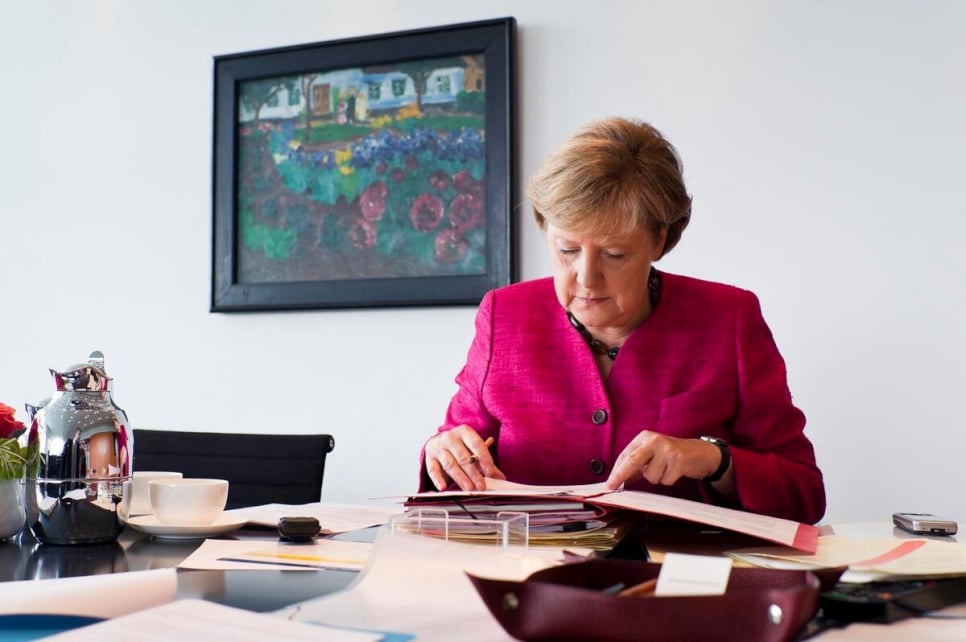 Dr. Angela Merkel, then Federal Chancellor of Germany, works in her office at the Federal Chancellery building in Berlin in 2011. © UNHCR/Steffen Kugler
Dr. Angela Merkel, then Federal Chancellor of Germany, works in her office at the Federal Chancellery building in Berlin in 2011. © UNHCR/Steffen Kugler
GENEVA - UNHCR, the UN Refugee Agency, announced today that Dr. Angela Merkel, the former Federal Chancellor of Germany, will receive the 2022 UNHCR Nansen Refugee Award.
Each year, the award - named after the Norwegian explorer, scientist, diplomat and humanitarian Fridtjof Nansen - is given to an individual, group or organization who has gone above and beyond the call of duty to protect refugees, internally displaced or stateless people.
Under then Federal Chancellor Merkel's leadership, Germany welcomed more than 1.2 million refugees and asylum seekers in 2015 and 2016 - at the height of the conflict in Syria and amid deadly violence in other places.
At that time, the then Chancellor said: "It was a situation which put our European values to the test as seldom before. It was no more and no less than a humanitarian imperative." She called on her fellow Germans to reject divisive nationalism and urged them instead to be "self-assured and free, compassionate and open-minded".
Filippo Grandi, the UN High Commissioner for Refugees, praised former Federal Chancellor Merkel's determination to protect asylum-seekers and to stand up for human rights, humanitarian principles and international law. "By helping more than a million refugees to survive and rebuild, Angela Merkel displayed great moral and political courage," Grandi said.
"It was true leadership, appealing to our common humanity, standing firm against those who preached fear and discrimination. She showed what can be achieved when politicians take the right course of action and work to find solutions to the world's challenges rather than simply shift responsibility to others."
The selection committee said it was recognizing former Federal Chancellor Merkel's "leadership, courage and compassion in ensuring the protection of hundreds of thousands of desperate people" as well as her efforts to find "viable long-term solutions" for those seeking safety.
As well as protecting people forced to flee war, persecution and human rights abuses, the former Chancellor was the driving force behind Germany's collective efforts to receive them and help them integrate into society, through education and training programmes, employment schemes and labour market integration. She was also key in expanding Germany's resettlement programme, which helped protect tens of thousands of vulnerable refugees.
She was also instrumental in ensuring Germany's growth as a substantive, reliable and active humanitarian partner, including in refugee operations around the world. Both her policies and her public statements were positive forces in European and global debates on issues of asylum and the management of crises of forced displacement.
The UNHCR Nansen Refugee Award selection committee has also honoured four regional winners for 2022:
- In Africa, the Mbera Fire Brigade, an all-volunteer refugee firefighting group in Mauritania that has extinguished more than 100 bushfires and planted thousands of trees to preserve lives, livelihoods and the local environment;
- In the Americas, Vicenta González, whose nearly 50 years of service to displaced and other vulnerable people included establishing a cacao cooperative in Costa Rica to support refugees and host-community women, including survivors of domestic violence;
- In Asia and the Pacific, Meikswe Myanmar, a humanitarian organization that assists communities in need, including internally displaced people, with emergency items, health care, education, and livelihoods opportunities;
- In the Middle East and North Africa, Dr. Nagham Hasan, an Iraqi gynaecologist providing medical and psychosocial care to Yazidi girls and women who survived persecution, enslavement and gender-based violence at the hands of extremist groups in northern Iraq.
The award will be presented to the former German Chancellor in Geneva on 10 October at a ceremony along with the regional winners.
With the number of forcibly displaced people around the world passing 100 million for the first time, Grandi said it was imperative that the public retain their sense of compassion towards those forced to flee their homes - and that countries continue to uphold the ancient tradition of asylum, as have most countries, including longstanding and generous hosts like Türkiye, Pakistan, Uganda and others.
This year marks a century since Fridtjof Nansen - the first High Commissioner for Refugees - was awarded the 1922 Nobel Peace Prize for his efforts to repatriate prisoners of war and to protect millions of refugees displaced by conflict, revolution and the collapse of the Romanov, Ottoman and Austro-Hungarian Empires.
It is also 100 years since the creation of the Nansen passport, an identity document for refugees, many of them stateless, that also enabled its holders to move across borders in search of work.
Media page: https://www.unhcr.org/media-nansen-refugee-award-2022






